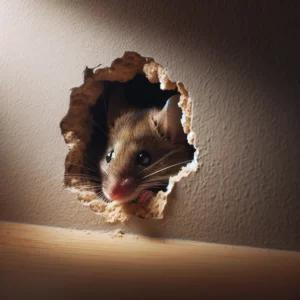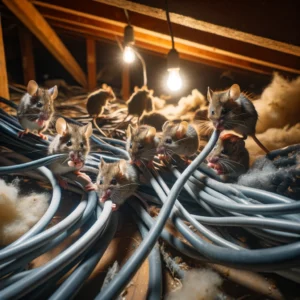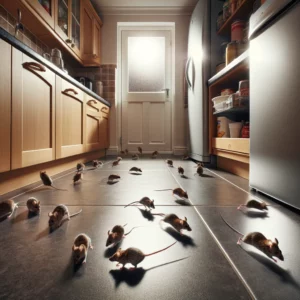
Mice can be a nuisance in any home, but when you live in Dallas, Texas, dealing with mice infestation becomes even more critical. The warm climate and abundant food sources make Dallas an attractive place for these unwanted guests. To protect your home and keep mice at bay, it's essential to understand the ins and outs of mice behavior, the potential dangers they pose, and the proactive measures you can take to keep them out.
Before diving into effective strategies for keeping mice out, let's take a closer look at these tiny creatures. Mice belong to the family Muridae, characterized by their small size, soft fur, and long tails. One of the most intriguing aspects of mice is their sharp teeth, a result of their need to chew on various materials to keep them trimmed and healthy.
Mice have a fascinating dental structure that allows them to adapt and survive in different environments. Their formidable incisors are constantly growing, and they use them to gnaw through various surfaces, including wood, plastic, and even concrete. These sharp teeth are essential for their survival, as they enable mice to access food sources and create shelter. Understanding this behavior sheds light on the potential entry points that mice may use to gain access to your home.

It's fascinating to consider how mice use their teeth as versatile tools. They can chew through almost anything, allowing them to explore and exploit their surroundings. This ability is not only impressive but also poses a challenge when it comes to keeping them out of our homes. Mice can easily gnaw through weak points in our homes' structures, such as cracks in the foundation or gaps around windows and doors. By understanding the adaptability of their sharp teeth, we can better protect our homes from these persistent intruders.
Contrary to popular belief, mice are intelligent creatures. They possess excellent memory and cognitive abilities, allowing them to navigate their surroundings and find food sources. Their intelligence also helps them learn and adapt to new environments quickly. This means that traditional methods of mouse control may not always be effective, as mice can quickly learn to avoid traps or bait. It is crucial to employ comprehensive prevention strategies to outsmart these tiny trespassers.
Understanding the intelligence of mice can also help us anticipate their behavior and prevent infestations. By knowing their preferences for food, nesting areas, and travel routes, we can strategically place deterrents and create barriers that discourage them from entering our homes. This proactive approach is essential in keeping our living spaces mouse-free.
One of the reasons mice can infiltrate homes so effortlessly is their ability to squeeze through tiny openings. Their compact bodies and flexible skeletons allow them to navigate narrow spaces with ease. These resilient creatures can fit through holes as small as a dime, making it essential to seal any potential entry points diligently.
Understanding the adaptability of mice's compact bodies highlights the need for a thorough inspection of your home to fortify its defenses against these unwanted guests. Check for gaps in walls, utility entry points, and vents, as these are common areas where mice can gain access. By addressing these vulnerabilities, you can significantly reduce the chances of a mouse infestation.
Additionally, mice are skilled climbers and can scale vertical surfaces effortlessly. This means that even upper floors and attics are not safe from their intrusion. It is essential to inspect and reinforce all areas of your home, including the roofline and exterior walls, to ensure there are no potential entry points for these agile climbers.
Having a mice infestation in your Dallas home can have severe consequences. Apart from being a nuisance, mice pose various dangers that could jeopardize your health and property. Understanding the potential risks is crucial in motivating you to take proactive measures to prevent their entry into your living space.
Mice are carriers of various diseases and parasites that can be harmful to humans. They can contaminate food and surfaces with their urine, droppings, and saliva. This contamination can lead to the spread of diseases such as salmonellosis, hantavirus, and leptospirosis. Salmonellosis is a bacterial infection that causes symptoms like diarrhea, fever, and abdominal cramps. Hantavirus is a severe respiratory disease that can be fatal in some cases. Leptospirosis is a bacterial infection that affects the liver and kidneys, causing symptoms such as high fever, headache, and muscle pain.
Furthermore, their constant gnawing can cause structural damage to your property, risking fires if they chew through electrical wires. Mice have incisors that continuously grow, and they need to gnaw on objects to keep their teeth at a manageable length. Unfortunately, this means that they can chew through insulation, wood, and even electrical wires. If they damage electrical wires, it can lead to short circuits and potentially start a fire.

Mice infestations can also have psychological effects on homeowners. The thought of these small creatures scurrying around your home can cause anxiety and stress. The constant fear of encountering a mouse or finding evidence of their presence can disrupt your peace of mind and affect your overall well-being.
Additionally, the presence of mice can attract other pests into your home. Mice leave behind pheromone trails that signal to other mice that your home is a safe place to nest. This can lead to an increased population of mice and potentially attract other pests such as rats, cockroaches, and ants. Dealing with multiple pest infestations can be overwhelming and require additional time, effort, and resources to eradicate.
Dealing with a mice infestation can also have significant financial implications. The damages caused by these pests can lead to costly repairs, not to mention the potential loss of personal belongings to contamination. Mice can chew through walls, insulation, and furniture, causing structural damage that requires professional repairs. The cost of hiring pest control services and purchasing traps, baits, and deterrents can also add up.
Furthermore, if mice contaminate your food or pantry items, you may need to discard them to ensure your safety. This can result in wasted groceries and additional expenses to restock your kitchen. In severe cases, where mice have caused extensive damage to your property, you may even need to temporarily relocate while repairs are being done, incurring additional costs for accommodation.
In conclusion, a mice infestation can have far-reaching consequences beyond being a mere annoyance. From the potential health risks to the financial burden it can impose, it is essential to address a mouse problem promptly and effectively. Taking preventive measures, such as sealing entry points and practicing good sanitation habits, can help minimize the chances of a mice infestation and protect your home and well-being.
Thankfully, there are effective strategies you can utilize to mouse-proof your Dallas home and keep these pesky critters out.
Mice infestations can be a nuisance, causing damage to your property and posing health risks. These small rodents are known for their ability to squeeze through tiny openings, making it essential to take proactive measures to prevent them from entering your home.
Start by conducting a thorough inspection of your home, paying close attention to potential entry points such as gaps in doors, windows, and vents. Mice can fit through openings as small as a dime, so it's crucial to seal any gaps you find. Use materials like caulk or steel wool to block these entryways, as mice are unable to chew through these substances.
It's also important to address any potential food sources that might attract mice. Store food in airtight containers, including pet food, and ensure that your pantry is well-organized. Mice are opportunistic feeders and can survive on just a few crumbs, so keeping your kitchen clean and free of food debris is essential.
Besides sealing entry points, consider installing door sweeps and weather stripping to further fortify your home's defenses. These measures not only help keep mice out but also improve energy efficiency by preventing drafts. Inspect your home's foundation for any cracks or gaps and seal them accordingly.
Trimming vegetation and eliminating clutter in your yard can also reduce hiding spots and potential nesting sites for mice. Mice are attracted to areas with ample cover, such as overgrown shrubs or piles of debris. By maintaining a well-manicured yard, you create a less appealing environment for these rodents.
If you're dealing with a persistent mouse problem or want additional peace of mind, consider using traps or professional pest control services. Traps can be an effective way to catch and remove mice, but it's important to place them strategically and check them regularly. Professional pest control services have the expertise and tools to identify and eliminate mouse infestations, providing long-term solutions to keep your home mouse-free.

Remember, preventing mice infestation in your Dallas home is a task that requires both knowledge and action. By understanding mice behavior, recognizing the dangers they pose, and implementing proactive measures, you can effectively keep these unwanted guests out of your living space. Early prevention is key to avoiding the hassles and potential risks associated with mice infestation.